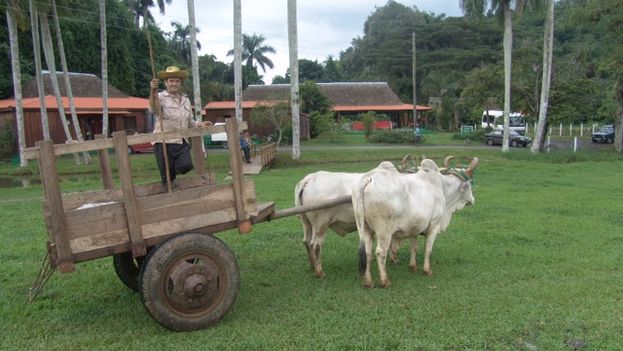
![]() 14ymedio, Olea Gallardo, Havana, 6 November 2020 — Measures announced on this Thursday’s Roundtable TV program suggest a tentative relaxation of the agricultural market.
14ymedio, Olea Gallardo, Havana, 6 November 2020 — Measures announced on this Thursday’s Roundtable TV program suggest a tentative relaxation of the agricultural market.
For example, private farmers will be able to sell part of their production on their own, provided that they first comply with Acopio’s* agreed deliveries. This is what emerges from the convoluted words of the Minister of Agriculture, Gustavo Rodríguez Rollero, during his television speech: “Products that, due to their logistical or financial problems of collecting and trading entities cannot be purchased in accordance with the provisions established in contracts, may be sold through other forms of commercialization”.
This will resolve a frequent complaint of Cuban farmers: that Acopio lets part of the products rot by not having the means to collect them.
The minister stated that with this new policy “the country intends to make the entire collection and marketing system more flexible, and eliminate the monopoly role of Acopio, the Business Collection System”.
“This month, the product balance is 100,000 tons, that is, we still have a product deficit of over 50,000 tons that we have not generated”, acknowledged the Minister of Agriculture
Rodríguez Rollero acknowledged that agricultural production is far from meeting the basic needs of the population: “30 pounds per capita per month, per inhabitant, some 154,000 tons of agricultural products, whether meats, vegetables and fruits,” the minister explained. “This month the balance of products is 100,000 tons, that is, we still have a deficit of over 50,000 tons of products that we have not produced.”
To try to alleviate the severe food crisis that Cuba is plunged in, the Council of Ministers announced other provisions. Among them, flexibility in the hiring of workers by “individual producers, landowners and usufructuaries (leasers), those having the legal right of enjoying the profits of property belonging to another”, the approval of “tax incentives” and the “recovery of bovine livestock.”
“This does not affect or benefit us in the least,” Rolando Villegas, a farmer from the Guane area in Pinar del Río, tells 14ymedio. “The crops that are a distribution monopoly, such as the tobacco that we produce, continue the same way, as is the case with coffee growers and those who grow cocoa or potatoes”, he warns.
“In addition, the goals that Acopio sets for us to sell to the State are high and prices are low. Many times, we have more losses than profits to meet those amounts”, Villegas points out. “what little remains after complying with these standards often goes to our families’ self-consumption, and there are farmers in this area who for years have had direct agreements with paladares (private restaurants) and food businesses” for direct sales.
“What is the difference?” a farmer asks himself. “That now we can declare on paper what we have been doing for a long time”
“What is the difference?” a farmer asks himself. “Now we can declare on paper what we were doing a long time ago,” he says. “I did not watch The Roundtable program yesterday because we didn’t have power, but some friends told me that they were going to announce the death of Acopio but it didn’t happen, it’s still alive, kicking and screwing us.”
Raúl Castro’s government had already implemented similar measures in 2011 aimed at opening up the field, but reversed them in 2016 without offering an explanation.
Cuba imports more than 60% of the food it consumes, as well as a large amount of agricultural consumable goods, and Cuban producers have been asking for a relaxation of the rules for the countryside for years.
Last April, with growing shortages due to the closure of the borders due to the COVID-19 pandemic, the League of Independent Farmers and the Cuban chapter of the Latin American Federation of Rural Women launched the initiative “Without the Countryside There is No Country” which asks the Government for five concrete measures to liberalize agriculture: freedom for production and distribution, freedom to set market prices, freedom to import and export without State mediation, elimination of taxes for ten years and delivery of permanent property titles to all producers.
*Translator’s note: Acopio is Cuba’s State Procurement and Distribution Agency
Translated by Norma Whiting
____________
COLLABORATE WITH OUR WORK: The 14ymedio team is committed to practicing serious journalism that reflects Cuba’s reality in all its depth. Thank you for joining us on this long journey. We invite you to continue supporting us by becoming a member of 14ymedio now. Together we can continue transforming journalism in Cuba.
